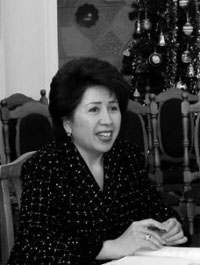Dec 22, 2025
Dec 22, 2025
The development of personal diplomacy is not an Uzbeki tradition - Akhmedjanova was one of the first women to use it. But it was when she became chairperson of Tashkent region's Women's Committee three years ago that she began to realize her primary goal: the integration of local women - whom she assists in human rights, legal advice and setting up small enterprises - with the international community.
 Adiba K Akhmedjanova, 51, initiated the Women's Club of International Friendship called Sodruzhestvo ('cooperation' in Uzbeki) to bring women from varied national origins together and promote mutual understanding. The organization helps Uzbek women from the villages meet people from other countries and become familiar with other cultures.
Adiba K Akhmedjanova, 51, initiated the Women's Club of International Friendship called Sodruzhestvo ('cooperation' in Uzbeki) to bring women from varied national origins together and promote mutual understanding. The organization helps Uzbek women from the villages meet people from other countries and become familiar with other cultures.
After graduating from the Tashkent State Pedagogical and Agricultural Institutes, Akhmedjanova worked for 17 years (from 1980 to 1997) at the Tashkent State Agrarian University and rose to vice-rector. She guided the education and training of students, including working with foreign students. During this period, she was also deputy director at UN courses on skills improvement for experts from developing countries such as Togo and Tunisia. From 1997-98, she worked as Chairperson of the Association of Dekhkan Farmers of the Kibray district in the Tashkent region, setting up many farms. In 2001, she was appointed deputy of the khokim (district chief) of the Tashkent region, and was elected chairperson of the region's Women's Committee. This wide and varied exposure to other cultures led her to understand more fully why women must integrate with the international community.
An activist for almost four years now, Akhmedjanova says, "It is here that I received the chance to realize many ideas and dreams. My most important goal is the integration of Uzbekistan women into the women's movements of the world, and to consolidate the efforts of women all over the world in their struggle for peace and against terrorism. The direction of social development is that of internationalism and tolerance."
Partnership relationships have been developed with the embassies of the UK, Byelorussia, Germany, Malaysia, Republic of Moldova, Indonesia, Iran, Israel, Egypt, Russia, Ukraine, USA, France, South Korea and Japan in Uzbekistan, and with international organizations such as UNICEF, UNIFEM, the Conrad Adenauer Fund, the Organization for Security and Cooperation in Europe (OSCE) and Handicap International.
Akhmedjanova has also created 'Woman to Woman', a network that encourages solidarity and the sharing of experiences between women, and signed an agreement with the Egyptian Women's Association for long-term cooperation between Egyptian women and the women of Tashkent province. She organized Girl Leaders, a new centre in Ahangaran City, and the Association of Women Farmers in the Tashkent Province. She has also attended training courses on gender-related issues in the US, Turkey, Germany, Japan, the Netherlands and Israel.
Believing that the development of NGOs is a powerful tool for the social and economic stability of Uzbekistan, Akhmedjanova participates directly in the creation of new NGOs and gives them ongoing support.
As former head of the Association of Dekhkan Farmers, Akhmedjanova knows how difficult it is to work the land, and to grow and pick cotton. So, she invited diplomats - from France, the US, Italy, Japan, UK and other nations - along with their families to pick cotton with the local farmers. During a break, she organized a quiz to test the guests' knowledge of cotton. At the end of day, the diplomats told her, "Now we understand how difficult it is to make our cotton clothes, and we must thank the farmers who grow cotton for us."
Akhmedjanova has made many contributions to the mass media, including articles in The Tashkentskaya Pravda on many women's issues. She initiated a permanent page 'Woman, Family and Society' in the Uzbek daily, The Evening Tashkent. She has also organized regular radio broadcasts on the state channel, Dustlik.
Says Akhmedjanova, "It is my dream to create women's TV in my country and to show traditions, culture and the lives of women in the world."
(Adiba K Akhmedjanova is one of a thousand PeaceWomen profiled as part of the 'PeaceWomen Across the Globe' project; www.1000peacewomen.org.)
By arrangement with Women's Feature Service
08-Oct-2006
More by : Albina Belevich